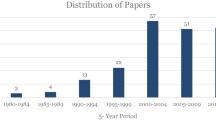Abstract
The paper reviews the ways organizations are thought to be changing as a result of Computer Supported Cooperative Work (CSCW). While claims which exaggerate the impact of technological changes should not be taken seriously, within the context of current developments in world capitalism CSCW assumes particular importance raising cultural and organizational problems at least as much as economic and technological ones. The flexibility, variety and disorder associated with ‘post-modern’ organizations (i.e. organizations characteristic of the epoch after modernism) necessitate the adoption of ‘postmodern’ approaches to understanding (i.e. approaches to the theory of knowledge developed in linguistics and philosophy) which emphasise the significance of communication, interpretation, improvization, negotiation and learning processes. The suggestion is that, for the impact of CSCW to be understood, conventional theories of organization should be replaced by theories of collective activity.
Similar content being viewed by others
Author information
Authors and Affiliations
Rights and permissions
About this article
Cite this article
Blackler, F. Post(-)modern organizations: understanding how CSCW affects organizations. J Inf Technol 9, 129–136 (1994). https://doi.org/10.1057/jit.1994.13
Published:
Issue Date:
DOI: https://doi.org/10.1057/jit.1994.13




